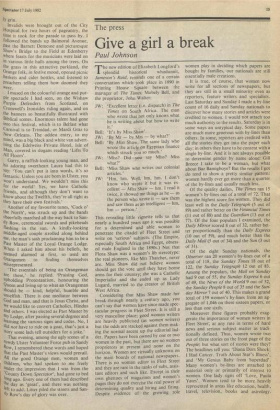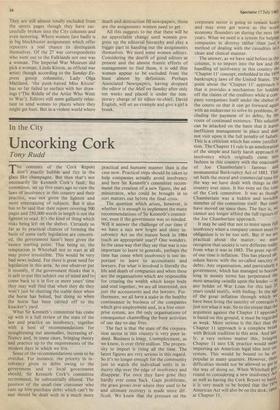The press
Give a girl a break
Paul Johnson
The new edition of Elizabeth Longford's splendid historical whodunnit, Jameson's Raid, reminds one of a certain conversation which took place in 1890 in Printing House Square between the marager of The Times, Mobely Bell, and the proprietor, John Walter: JW: 'Excellent letter (i.e. dispatch) in The Times on South Africa. The man who wrote that not only knows what he is writing about but how to write it.'
Bell: 'It's by Miss Shaw'.
JW: 'By Mr — by Mrs — by what?' Bell: 'By Miss Shaw. The same lady who
wrote the article on Egyptian finance which struck you so much.'
JW: 'Miss? Did you say Miss? Miss what?'
Bell: 'Miss Shaw who writes our colonial articles.'
JW: hm. Well, hm, hm. I don't know who wrote it but it was ex- cellent — Miss Shaw — hm. I read it twice, it showed me things as he — as the person who wrote it — saw them and saw them as an intelligent — hm, hm — person.'
This revealing little vignette tells us that nearly a hundred years ago it was possible for a determined and able woman to penetrate the citadel of Fleet Street and write on 'serious' subjects. (The Empire, especially South Africa and Egypt, obsess- ed male England in the 1890s.) Not that Flora Shaw was a women's lib stereotype: the real pioneers, like Mrs Thatcher, never are. Miss Shaw did not believe women should get the vote until they have borne arms for their country; she was a Catholic Imperialist and she ended up as Lady Lugard, married to the creator of British West Africa.
Considering that Miss Shaw made her break-through nearly a century ago, you can't say that women have since made spec- tacular progress in Fleet Street. It is still a very masculine place; good women writers are heavily publicised (as women writers) but the odds are stacked against them mak- ing the normal ascent up the editorial lad- der. Papers have been owned by one or two women in the past, but there are no women proprietors at present and none on the horizon. Women are virtually unknown on the main boards of national newspapers. There is no woman editor in Fleet Street and they are rare in the ranks of subs, assis- tant editors and such like. Except in their own ghettoes of magazines and women's pages they do not exercise the real power of determining quality and hiring and firing. Despite evidence of the growing role
women play in deciding which papers are bought by families, our nationals are still essentially male creations.
It is true, of course, that women now write for all sections of newspapers, but they are still in a small minority even as reporters, feature writers and specialists. Last Saturday and Sunday I made a by-line count of 16 daily and Sunday nationals to discover how many stories and articles were credited to women. I would not attach too much authority to the results. Saturday is in some ways an untypical day. Some papers are much more generous with by-lines than others. In some, reporters are credited with all the stories they get into the paper each day; in others they have to be content with a single by-line. And it is not always possible to determine gender by name alone: Gill Breece I take to be a woman, but what about Baz Bamigboye? But the results I got do tend to show a pretty similar pattern: women hardly ever get more than a quarter of the by-lines and usually much less.
Of the quality dailies, The Times ran 15 women's by-lines out of a total of 72. That was the highest score for women. They did least well in the Daily Telegraph (5 out of 89). and rather better on the Financial Times (11 out of 88) and the Guardian (13 out of 77). Of the four populars I examined, the Daily Mirror scored 8 out of 32, rather bet- ter proportionally than the Daily Express (10 out of 59), and much better than the Daily Mail (5 out of 34) and the Sun (3 out of 31).
Of the eight Sunday nationals, the Observer ran 20 women's by-lines out of a total of 118, the Sunday Times 18 out of 122, the Sunday Telegraph 12 out of 83. Among the populars, the Mail on Sunday had 9 out of 55, the Sunday Express 6 out of 49, the News of the World 9 out of 52, the Sunday People 8 out of 35 and the Sun- day Mirror 7 out of 40. This makes a grand total of 159 women's by-lines from an ag- gregate of 1,046 on these sixteen papers, or less than one sixth.
Moreover these figures probably exag- gerate the importance of women writers in Fleet Street; at any rate in terms of hard news and serious subject matter as tradi- tionally defined. Thus, women wrote two out of three stories on the front page of the People; but what sort of stories were they? The headlines tell you: 'Diana Dors Shock; I Had Cancer. Truth About Star's Illness', and 'My Genius Baby from Superdad'. Many women's by-lines are attached to material only or primarily of interest to women. One lady signs off 'Love, Paula Yates'. Women tend to be more heavily represented in areas like education, health, travel, television, books and astrology. They are still almost totally excluded from the sports pages though they have suc- cessfully broken into the City columns and even motoring. Where women fare badly is in big blockbuster assignments which offer reporters a real chance to distinguish themselves. Of the 27 war correspondents who went out to the Falklands not one was a woman. The Imperial War Museum did pick a woman, Linda Kitson, as official war artist; though according to the Sunday Ex- press gossip columnist, Lady Olga Maitland, 'the punk-haired Miss Kitson' has so far failed to surface with her draw- ings (`The Riddle of the Artist Who Went to War'). Editors still seem gallantly reluc- tant to send women to places where they might get hurt. But in a violent world where
death and destruction fill newspapers, those are the assignments women need to get.
All this suggests to me that there will be no appreciable change until women pro- gress up the editorial hierarchy and play a bigger part in handing out the assignments themselves. We need some women editors. Considering the dearth of good editors at present and the almost frantic efforts of management to find them, it is odd that women appear to be excluded from the hunt almost by definition. Perhaps Associated Newspapers, having dropped the editor of the Mail on Sunday after only ten weeks and placed it under the tem- porary charge of its editor-in-chief, David English, will set an example and give a girl a break.



































 Previous page
Previous page